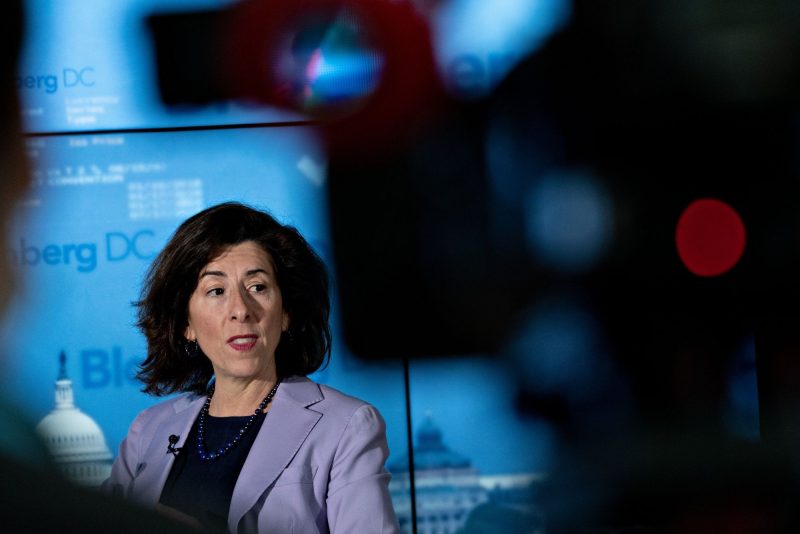
New Senate bill would give Commerce a more direct route to ban TikTok
The Commerce Department would wield broad powers to ban or restrict TikTok and other technology apps rooted in foreign countries under a bill introduced Tuesday by a bipartisan group of 12 senators.
The bill marks the federal government’s latest attempt to resolve a standoff with TikTok, the wildly popular short-video app owned by the Chinese company ByteDance that federal officials have speculated one day might be misused for propaganda or blackmail by the Chinese government.
But banning an app that more than 100 million people in the United States use either to express themselves or to consume news and opinions could also violate the First Amendment. A federal magistrate in 2020 blocked the Trump administration from forcing Apple and Google to remove the Chinese app WeChat from their app stores, citing the government’s “modest” evidence about the app’s threat and concerns over violating Americans’ constitutional rights.
In her 22-page order, U.S. Magistrate Judge Laurel Beeler found that banning WeChat, which at the time had an estimated 19 million users, would “burden substantially more speech than is necessary to serve the government’s significant interest in national security.”
U.S. officials have argued that TikTok could share Americans’ data with the Chinese government for espionage purposes or skew its video recommendations toward Communist Party propaganda. TikTok officials have said neither has happened, and the U.S. government has provided no evidence that it has.
The Restricting the Emergence of Security Threats that Risk Information and Communications Technology (RESTRICT) Act would give Commerce officials the authority to evaluate and block technology deals involving companies from six “foreign adversary” countries, including China, Russia, Iran, Cuba, Venezuela and North Korea. Despite the inclusion of other countries in the proposed legislation, nearly all the apps the senators mentioned Tuesday come from China.
Sen. Mark R. Warner (D-Va.) said the “risk-based, rule-bound” process would let Commerce officials take a “more comprehensive approach” to mitigating threats from foreign companies, as opposed to the previous “whack-a-mole” strategy the U.S. government has used to address Chinese tech companies such as Huawei and ZTE.
The White House lent its support to the proposal, with national security adviser Jake Sullivan saying in a statement that the bill would help “prevent certain foreign governments from exploiting technology services … in a way that poses risks to Americans’ sensitive data and our national security.”
The senators on Tuesday aimed most of their criticism at the Chinese government, claiming that TikTok could be weaponized against Americans because its “number one allegiance” had to be the Chinese government. Sen. Dan Sullivan (R-Alaska) said the senators wanted to bring “all instruments of American power and American policy to address the Chinese Communist Party challenge,” including “technology, our private sector and our commitment to liberty.”
TikTok is a private company with thousands of U.S. employees, and company officials argue that they have been held to an unfair standard compared with other American social media firms who gather the same data.
Commerce Secretary Gina Raimondo, who would lead the tech-review effort if passed, also has expressed caution with banning TikTok, saying the United States should not trample on the values that have traditionally separated America’s free-market approach from China’s more restrictive dogma of corporate control.
“Passing a law to ban a single company is not the way to deal with this issue,” she told Bloomberg News this month. “However much I hate TikTok … this is America.”
The House Foreign Affairs Committee last week passed a Republican-sponsored bill that would grant President Biden the authority to ban TikTok outright. Republicans who supported it said it would help protect Americans against “subversive data collection,” while Democrats argued it should not be rammed through without further debate.
TikTok has for three years been involved in negotiations with the Committee on Foreign Investment in the United States, a group of nine federal agencies with the power to overturn corporate deals involving overseas business interests.
The company has spent $1.5 billion building a restructuring proposal, known as Project Texas, that would carve off TikTok operations in the United States into a subsidiary whose leaders would be vetted by the U.S. government. The proposal was offered to CFIUS in August but has yet to be approved, TikTok officials have said.
TikTok chief executive Shou Zi Chew, set to testify before Congress later this month, told The Washington Post last month it would be “a real shame if our users around the world are not able to hear” American TikTok users’ voices anymore.
